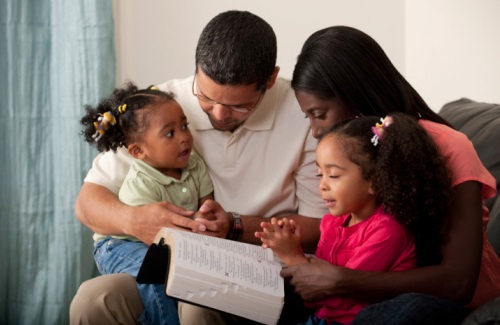Building your family in Christ
Today, more than ever, Americans are becoming less religious. According to Pew Research, one-third of adults in the US say they’re not a “religious person.” Even more alarming, 25% of adults under the age of 30 describe themselves as “atheist,” “agnostic” or “nothing in particular.” So how do you try and raise godly children in a worldly environment? What practices can you and your spouse implement to encourage spiritual growth in your kids? We use the word “encourage” because ultimately, whether or not a child accepts Jesus is up to each individual and the work of the Holy Spirit.

Here are five things you can do today to impact your children spiritually for tomorrow:
1. Pray for your kids.
The minute we learned Heidi was pregnant, we began to pray for our baby. We prayed he or she would grow to love Jesus, would have a hunger for God’s Word, and would desire to please God. And we didn’t stop there! As our son or daughters grew up, our prayers for them encompassed more aspects of their lives. We prayed about their decisions, attitudes, finances, friends, their spiritual development, character, where they would attend school, jobs, protection, careers, strengths, weaknesses, and even their future spouse. Our attitude was to pray about anything that affected them. The Bible says in Philippians 4:6 to tell God what your requests are and we did! We know many of the blessings our children receive are a direct result of answered prayers, not only ours but also the prayers of friends and family.
2. Monitor influences.
Today our kids are bombarded with options. We have hundreds of channels on TV, Netflix, extra-curricular activities, sports, music, books, video games, the internet, and social media. Do you know what your children are listening to or watching? We all have a worldview. What influences are creating their worldview? Who or what is responsible for forming your child’s values on life, purpose, sexuality, politics, eternity, ethics, and God?
When our son was in junior high he was, like most teenage boys, very interested in music and he was listening to some music that, frankly, wasn’t very wholesome. Brad regularly sat down with him and together they listened to any song he wanted to purchase or download. They had a simple standard that if the song referenced sex, drugs, drinking or swearing it wasn’t allowed. Brad didn’t have to say much as they listened together and our son learned discernment in his song choices.
One of the biggest influences on our children is their friends. Several years ago we saw this quote, “Show me your friends and I’ll show you your life.” So true. Get to know your son or daughter’s friends. Be proactive and pay attention to the influences your kids are following.
3. Make spiritual growth a priority.
Kids don’t naturally grow in godliness; rather they drift toward sin. Together as parents discuss ways that you’ll encourage spiritual growth in your kids. Do you require your kids to attend church? We did. We told our kids that one of our core values was church attendance. We modeled it and we expected them to follow. Each night before bed we prayed with our kids and did devotions. Youth group and other Christian activities were encouraged. And we never disciplined our kids by taking away church or an activity that contributed to their spiritual growth.
4. Discipline sinful attitudes and choices.
In our home, a poor attitude reflected a heart problem. Our goal was to help develop godly attitudes and choices before wrong behavior (which shows the condition of one’s heart) was exhibited. We disciplined our kids for disrespectful or rebellious actions AND attitudes.
5. Talk about your relationship with Jesus Christ.
Deuteronomy 6:7 says we should discuss God’s Word with our kids. Tell your children about how God has blessed your life. Share areas where you’ve struggled if it’s appropriate. Encourage dialogue and questions. Our children grew up as pastor’s kids. Much of the time they were privy to tragedies or painful situations. We walked them through those tough circumstances as best we could. On the other hand, when we were the recipients of God’s goodness, we let our kids know. We’d say, “This happened because your dad is a pastor,” or “God has blessed our family.” We didn’t want our kids to grow up with a negative attitude towards ministry, the church, or God.
Building your kids spiritually takes intentionality and perseverance. As parents be sure to encourage and cheer for each other. When you do, you’ll build your children spiritually as well as build your marriage.

